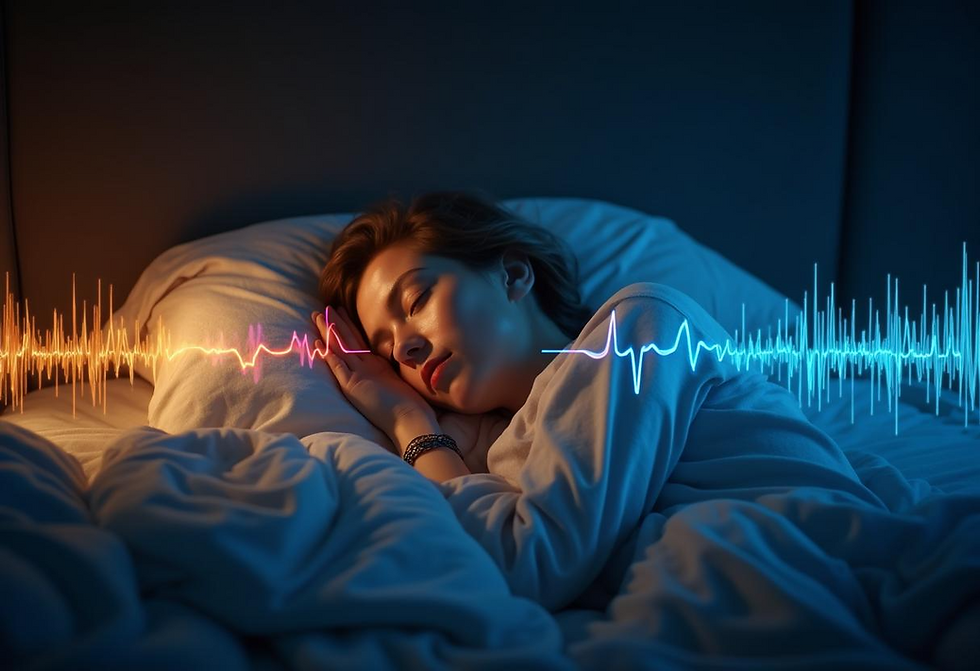Evening Wind-Down Routine - 30-Minute Sequence for Deep Sleep
- MindSpaceX

- Sep 2, 2025
- 5 min read

Did you know that one-third of adults report not getting enough sleep on a regular basis? In our hyper-connected world, the boundary between daytime activity and nighttime rest has become increasingly blurred. The blue light from our devices, work stress, and irregular schedules have sabotaged our natural sleep rhythms, leaving millions tossing and turning when they should be deeply sleeping.
Your evening routine might be the missing link between exhausting days and restless nights. This article presents a research-backed 30-minute wind-down sequence designed specifically to prepare your mind and body for deep, restorative sleep. By understanding and implementing these practices, you can transform your relationship with sleep and wake up feeling genuinely refreshed.
The Science of Sleep Preparation
Background & Context
The concept of a bedtime routine isn't new. Throughout history, humans have engaged in evening rituals to signal the transition from day to night. Before electricity, activities naturally wound down with the setting sun. Traditional practices across cultures—from evening prayers to family storytelling—served as natural transitions to sleep.
Modern sleep science has confirmed what our ancestors intuitively knew: the hours before bedtime significantly impact sleep quality. Your brain requires transition time to shift from the sympathetic nervous system (fight-or-flight mode) to the parasympathetic nervous system (rest-and-digest mode). Without this transition, your body may still be physiologically aroused even as you lie in bed, resulting in delayed sleep onset and reduced sleep quality.
Expert Analysis & Insights
Dr. Matthew Walker, neuroscientist and author of "Why We Sleep," emphasizes that "sleep is not like a light switch. You cannot expect to go from full speed to a standstill in a matter of minutes." Research from his sleep laboratory at UC Berkeley demonstrates that a structured wind-down period increases both the speed of falling asleep and the quality of subsequent sleep cycles.
A 2018 study in the Journal of Sleep Research found that participants who engaged in a 30-minute relaxation routine before bed experienced a 37% reduction in the time it took to fall asleep and reported a 50% improvement in subjective sleep quality compared to those who went directly from activity to attempting sleep.
According to Dr. Sonia Ancoli-Israel, Professor of Psychiatry at the University of California San Diego, "Consistency is key. When you perform the same relaxing activities in the same order each night, you're essentially training your brain to recognize these cues as preparation for sleep."
Recent research published in Sleep Medicine Reviews reveals that evening routines are particularly effective for those with insomnia or stress-related sleep disturbances, with improvements in sleep quality measurable after just one week of implementation.
The 30-Minute Wind-Down Sequence
Based on sleep science research, here's a structured 30-minute routine to prepare your body and mind for optimal sleep:
Minutes 1-10: Disconnect & Prepare
Digital Sunset: Power down all electronic devices. The blue light emitted from screens suppresses melatonin production, a crucial sleep hormone. A study from Harvard Medical School found that blue light exposure can delay melatonin release by up to 3 hours.
Prepare Tomorrow: Quickly lay out clothes, pack your bag, and write down any important tasks for tomorrow. This "brain dump" reduces cognitive load and prevents middle-of-the-night worrying, according to research from Baylor University.
Minutes 11-20: Physical Relaxation
Gentle Stretching: Perform 5-7 minutes of gentle yoga or stretching focusing on areas where you hold tension. Research in the Journal of Alternative and Complementary Medicine shows that gentle stretching before bed reduces muscle tension and activates the parasympathetic nervous system.
Warm Shower or Bath: If time permits, take a warm (not hot) shower or bath. According to a meta-analysis published in Sleep Medicine Reviews, bathing 1-2 hours before bedtime can decrease sleep onset by an average of 10 minutes by initiating the natural drop in body temperature that signals sleep readiness.
Minutes 21-30: Mental Unwinding
Mindfulness Meditation: Practice 5 minutes of simple mindfulness meditation focusing on breath. Research from Harvard Medical School shows this practice reduces the hyperarousal that prevents sleep.
Reading: Spend the final 5 minutes reading from a physical book (not an e-reader). A study from the University of Sussex found that just six minutes of reading reduces stress levels by 68%, preparing the mind for sleep more effectively than other relaxation methods.
Real-World Applications
Different demographics may need to adapt this routine to their specific circumstances:
For Working Parents: Dr. Arianna Huffington, sleep advocate and author of "The Sleep Revolution," recommends that busy parents split the routine into small segments throughout the evening. "Even micro-moments of relaxation between parenting duties can have a cumulative positive effect on sleep readiness," she explains.
For High-Stress Professionals: A case study published in the Journal of Occupational Health Psychology followed executives who implemented structured wind-down routines. After four weeks, participants reported a 62% improvement in sleep quality and demonstrated measurable improvements in next-day cognitive performance and decision-making abilities.
For Older Adults: Research from the National Institute on Aging suggests that older adults benefit particularly from the physical components of a wind-down routine, as gentle movement helps address age-related sleep changes and increases sleep efficiency.
Alternative Perspectives
Not everyone agrees on the optimal approach to evening routines. Some sleep specialists, like Dr. Michael Breus, author of "The Power of When," argue that routines should be personalized based on chronotype (your natural biological rhythm). "Night owls and morning larks may need different wind-down approaches," he suggests.
Others, like Dr. Sara Mednick, professor of cognitive science at UC Irvine, emphasize that for some individuals with certain circadian rhythm disorders, strict routines may actually increase sleep anxiety. "Flexibility within structure can be more beneficial for some people," she notes in her research published in Frontiers in Psychology.
However, the overwhelming consensus among sleep scientists supports the implementation of some form of consistent evening routine, with adaptations made for individual circumstances and preferences.
Practical Takeaways & Future Outlook
As sleep technology advances, researchers at the Stanford Sleep Medicine Center predict that personalized sleep routines based on individual biometric data will become the norm. Wearable technology that measures body temperature, heart rate variability, and even brain waves may soon guide us toward optimal personalized wind-down sequences.
Until then, the most effective approach is to:
Begin with the basic 30-minute framework outlined above
Track your results using a sleep journal or app
Modify specific elements based on what works best for you
Maintain consistency—perform your routine at approximately the same time each night
Dr. Michael Grandner, Director of the Sleep and Health Research Program at the University of Arizona, sums it up: "The best evening routine is one that you can actually stick with. Consistency trumps perfection."
There You Have it…
A well-designed evening routine isn't a luxury—it's essential infrastructure for quality sleep in our overstimulated world. The 30-minute wind-down sequence outlined here represents a science-backed approach to preparing your body and mind for the deep, restorative sleep you need.
By implementing these practices consistently, you're not just improving your nights—you're enhancing your entire life. Better sleep means improved cognitive function, emotional regulation, immune response, and overall health outcomes.
Ready to transform your relationship with sleep? Start tonight with just one element of this routine, then gradually build your complete wind-down sequence. Your future well-rested self will thank you.
For more science-backed strategies on optimizing your sleep and other aspects of cognitive performance, visit MindSpaceX.com, where you'll find related articles, personalized sleep assessments, and expert-led courses on mastering your mind-body connection.
References
Walker, M. (2017). Why We Sleep: Unlocking the Power of Sleep and Dreams. Scribner.
Harvard Medical School. (2020). Blue light has a dark side. Harvard Health Publishing.
Huffington, A. (2016). The Sleep Revolution: Transforming Your Life, One Night at a Time. Harmony.
Journal of Sleep Research. (2018). Effects of a structured pre-sleep routine on sleep onset and quality.
Sleep Medicine Reviews. (2019). Before-bedtime passive body heating effects on sleep latency and quality.
Journal of Alternative and Complementary Medicine. (2017). Yoga and stretching effects on sleep parameters.
University of Sussex. (2009). Reading reduces stress levels by 68%.
National Institute on Aging. (2020). Good Sleep for Good Health.
Breus, M. (2016). The Power of When. Little, Brown Spark.
Frontiers in Psychology. (2018). Individual differences in sleep routines and outcomes.
.png)













Comments